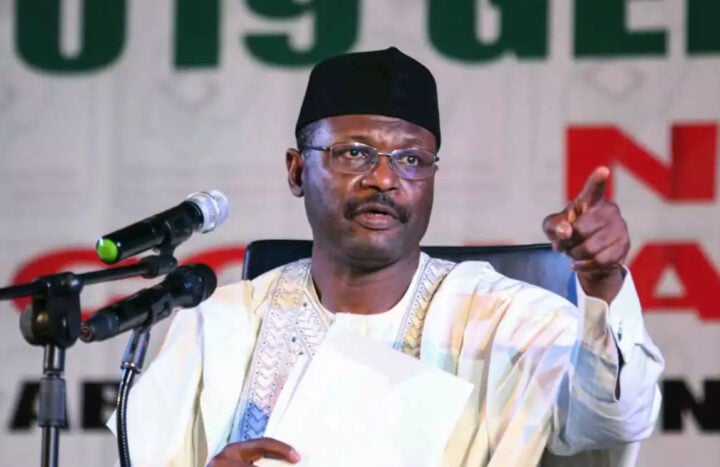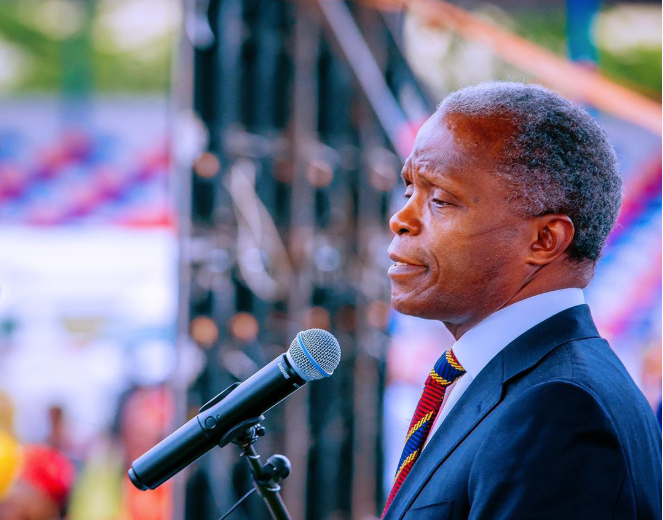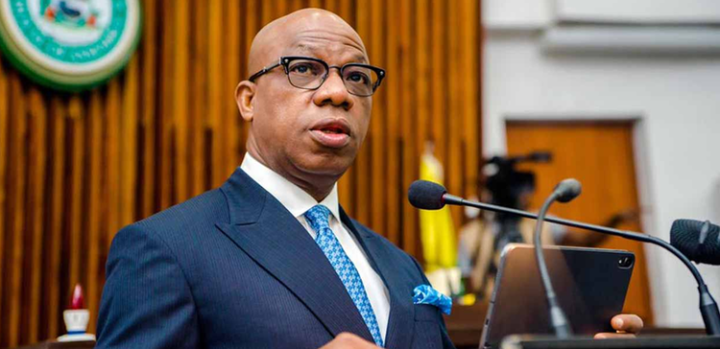BY DAN’ASABE GANA
In the last three months or so the Independent National Electoral Commission (INEC) has been in headline news over several issues for both the right and wrong reasons. These issues include the National Assembly’s (NA’s) review of the extant Electoral Act, the expansion of voter access to the Commission’s Polling Units (PUs), Senate clearance of the Presidential nominees to replace the six who left in November last year, the conflicting orders it had received from courts of co-ordinate jurisdiction on party primaries ahead of the off-season Anambra governorship election early next month, and its conduct of over two dozen bye-elections since last year. This piece is about what I believe are the two most important of these issues, namely NA’s review of the Electoral Act and the expansion of voter access to the Commission’s PUs.
First, the National Assembly’s (NA’s) review of the current Electoral Act. Eleven years ago the Assembly, under the then new leadership of Senator David Mark as President of the Senate and Barrister Aminu Tambawal as Speaker of the House of Representatives, promised to amend the 2010 Electoral Law to close several apparent loopholes in it within their first year in office. Somehow, the NA leadership failed to do so until in its final year.
However, when it eventually considered and approved its Bill and sent it to President Muhammadu Buhari he declined to sign it into Law, citing a number of objections. Three times thereafter the NA returned the Bill to the President and three times he vetoed it, the last time citing, among other objections, its closeness to the 2019 general election.
In the end INEC conducted the election under the 2010 law, much to the disappointment of the general public. It is important to note that in all the back and forth between the NA and the Presidency on the failed Bill, the important issue of provisions for electronic collation and transmission of results did not feature at all.
Advertisement
Not surprisingly, the current NA under the leadership of Ahmad Lawan as Senate President and Femi Gbajabiamila as Speaker of the House, responded to the public disappointment with the conduct of the 2019 election under a law widely perceived as flawed, by promising a brand new one well ahead of the next general election in 2023. As if to underscore its commitment to that promise, it honoured an invitation by INEC to participate in a retreat the Commission organized in March last year on a review of the country’s Electoral Legal Framework in Lagos.
Among the lead speakers at that retreat was the Deputy Senate President, Senator Ovie Omo-Agege. In his overview of the Bill to amend the Electoral Act, 2010, (Bill No. 122 of 2019) on March 5, he said, among other things, that “We are ready to resolve issues surrounding INEC’s introduction of necessary, appropriate and secured modern technologies into our electoral process. In this regard, we want to ensure that all relevant stakeholders in the electoral process are under a statutory mandate to comply fully with INEC’s guidelines, regulations and manuals.” (Emphasis his).
Over a year after that retreat nothing was heard again from the NA about the Bill. However, just when the public was beginning to despair about the current NA leadership’s commitment to electoral reform, it dusted the Bill for consideration early in July. This was good news for Nigerians if only because it raised the hope that the country would finally have a better Electoral Law than the current one for the conduct of the next general election in 2023, at least one clear year ahead.
Advertisement
Unfortunately, what at first looked like good news has since turned into not-so-good – some would say bad, very bad – news following the NA’s decision on July 16 to make the Commission’s electronic transmission of election results subject to clearance by both the NA and the National Communication Commission (NCC), the country’s regulator of telecommunications.
The relevant Clause – (52(3)) – of the amendment Bill – says “INEC may consider electronic transmission of results provided the national network coverage is adjudged adequate and secure by the National Communications Commission and approved by the National Assembly.”
These two provisos clearly contradict Section 78 of the Constitution which makes the registration of voters and the conduct of elections the sole prerogative of INEC. This Section says “The registration of voters and the conduct of the elections SHALL be subject to the direction and supervision of the Independent National Electoral Commission.” (Emphasis mine). It’s hard to be more categorical than this in asserting INEC’s autonomy in its conduct of all the processes of voter registration and elections.
Clause 52 (3) of the Bill in a way also contradicts Section 160 (1) of the Constitution which exempts INEC, of all the 14 Executive Bodies established by the Constitution under Section 153 (1) and whose chairmen and members the President has the prerogative of nominating, from being under his control or getting his approval in regulating its own affairs. On the contrary the Section gives it alone, among those 14 bodies, the authority to “confer powers and impose duties on any officer or authority for the purpose of discharging its function”, the exception being officers and authorities of State governments, in apparent deference to the autonomy of States in our Federal structure.
Advertisement
What this means obviously is that it is unconstitutional to subject INEC to the opinion of NCC, or of any Executive body for that matter, in carrying out its functions. Even more importantly, under the fundamental principle of separation of powers in our Constitution, it is wrong for the National Assembly to constitute itself into an executive body, which is what assigning to itself the role of certifying the availability of network coverage in the country amounts to.
In any case, the undisputable fact is that, contrary to NCC’s testimony at NA’s public hearing in July on the capacity of our service providers, the country has adequate network coverage for the transmission of results nationwide. As INEC has said in its 24-page Position Paper No 1/2021 titled “Electronic Transmission of Election Results” published last week and as the Commission’s spokesman, Barr Festus Okoye, has had occasions to point out, this fact was established over three years ago after several meetings with NCC itself, along with all the country’s major service providers well ahead of the 2019 general election.
The fact is that, in general, the use of Information Technology (IT) in elections has, as we have seen in Nigeria and elsewhere, enhanced their transparency, integrity and credibility. More specifically, in this country, we have seen how, first, the introduction of the Direct Data Capturing Machine (DDCM) in 2011 to create the country’s first digital and permanent Register of Voters, and, second, how the introduction of the Smart Card Reader (SCR) along with the Permanent Voters Card (PVC) for the accreditation of voters and authentication of their PVCs from 2015, has made our elections much, much more transparent and credible than they were before.
Since 2015 INEC has enhanced the performance of the SCRs, acquired more efficient hard wares and introduced several portals in its processes and procedures that have made things a lot more transparent and easier for itself and for all stakeholders in elections. For example, the Commission has introduced portals for parties to begin the submission of their candidates for elections online. Similarly, it has introduced portals for election observers and media organisations to register their observers and journalists from the comfort of their offices.
Advertisement
Above all, beginning from August 8, last year, during the Nasarawa Central State Constituency bye-election, the Commission introduced a portal called IReV (INEC result viewing portal) from which anyone sitting in the comfort of his home or office anywhere in the world can view the certified result of an election at any Polling Unit (PU), real life. This portal is the electronic version of the Commission’s Form EC 60 E, aka “people’s result sheet”, which is the poster to which a Polling Unit result written on Form EC 8 A and signed by the Presiding Officer and agents of contesting political parties is transferred and which every Presiding Officer is mandated to paste within the vicinity of the PU for public viewing.
Since the Nasarawa election, INEC has conducted two off-season governorship elections in Edo and Ondo States and about two dozen legislative bye-elections at various levels, occasioned by deaths or court orders. In all these elections, conducted in both urban centres and remote rural areas alike, the Commission’s IReV performed to universal acclaim.
Advertisement
Perhaps the most remarkable achievement of this innovation in conjunction, of course, with other innovations, is that not a single one of the elections the Commission has conducted since August last year has been rejected by the losers on account of its conduct.
IReV apart, the success of the on-going Continuous Voter Registration (CVR) exercise ought to convince any Doubting Thomas that there is sufficient network coverage in the country for the electronic transmission of results to be feasible. Equally, increasing improvements in the Commission’s electoral processes since 2015 ought to banish any doubts anyone has about its capacity to secure its processes.
Advertisement
As at September 20, when the CVR was suspended at the end of the first quarter which started on June 28 to allow for the mandatory one week display of the Register of Voters for claims and objections, more than 3.16 million of the over 4.62 million Nigerians who were registering as voters for the first time or were seeking to transfer, correct or replace their PVCs, started the process online from all the nooks and corners of the country.
Needless to say, the July 16 legislative decision could only serve to undermine what many would agree is probably the best news to have come out of INEC, at least in the last 25 years. This was the formal announcement on June 16 by its Chairman, Professor Mahmood Yakubu, at a Press Conference in its Headquarters, of its expansion of the Commission’s Polling Units from exactly 119,974 in 1996 to 176,846 this year, an increase of 56,872.
Advertisement
Twenty five years ago these roughly 120,000 Polling Units served what was then a voting population of nearly 58 million. At the end of those 25 years the voting population had grown to over 84 million. Yet the number of the PUs remained the same, with all the negative implications this had for the safety and convenience of voters.
Several times INEC tried to remedy the situation but each time it failed. It made the most controversial attempt under the Chairmanship of Professor Attahiru Jega in the run-up to the 2015 general election. That attempt was widely attacked as partisan in favour of the section of the country Jega came from, attacks which eventually forced his Commission to cancel it.
Learning from the Commission’s failure in expanding voter access to its PUs all these 25 years, Professor Yakubu and his team concluded that the secret to success was to consult all major stakeholders in the electoral process early and widely. And so in January this year, shortly after he started his second term, the first among the Commission’s Chairmen in its over 61-year history, he signed out and widely circulated a 53-page document titled “The State of Voter Access to Polling Units in Nigeria” in which the Commission took the reader through the history of PUs in the country with all its challenges for voter access, laid out three options for overcoming those challenges, and made a very strong case for expanding access to the PUs through the option of converting their 56,872 adjuncts into full-fledged PUs. These adjuncts, called Voting Points in States and Voting Point Settlements in FCT, had been created and used as interim solution to PU congestion over three electoral circles and had therefore become quite familiar to voters.
The document itself, sub-titled “Discussion Paper No 1/2021”, was the final outcome of intensive and extensive debate the Commission leadership initiated internally over the issue in order to avoid the deep and unhealthy split right down the middle of the Commission under Jega which outside partisan interests fed from to frustrate his good intention.
Because the Commission was able to present a solid and united front to the public on the issue, it was not difficult for it to convince the same public that converting the PU adjuncts into autonomous units was the best way to a more permanent solution to congestion at the PUs. It was therefore not surprising that barely two months after it engaged with external stakeholders in our electoral process, including political parties, federal legislators, the Presidency, civil society organisations, the media and security organisations, the Commission received unanimous public support for its preferred option.
It then followed this unanimous public support with extensive engagement with all stakeholders and communities on how and where best to locate the Voting Points and Voting Point Settlements as autonomous PUs, using appropriate information technology.
It should be apparent from all this that the decision of the National Assembly in mid-July to reject, for all practical purposes, INEC’s position on the feasibility of electronic transmission of election results, can only undermine this achievement, perhaps the Commission’s greatest at least in the last 25 years.
Now that the federal legislators have resumed from their July recess and set up a Joint Committee of their two Chambers to harmonise their differences in the Bill, let us hope they will reverse themselves and approve the electronic transmission of election results.
Hopefully, between the National Assembly and the Presidency the two, knowing fully well that none of the three arms of Government has absolute freedom to do as it likes in carrying out its constitutional roles, will give Nigerians not just a brand new Electoral Law before the end of this year. Hopefully, it will be a forward looking law that will not attract litigations about its constitutionality but would, instead, allow INEC to build on the tremendous progress it has made in recent years in using information technology to make the country’s electoral system one the most credible in the world.
Views expressed by contributors are strictly personal and not of TheCable.
Add a comment






